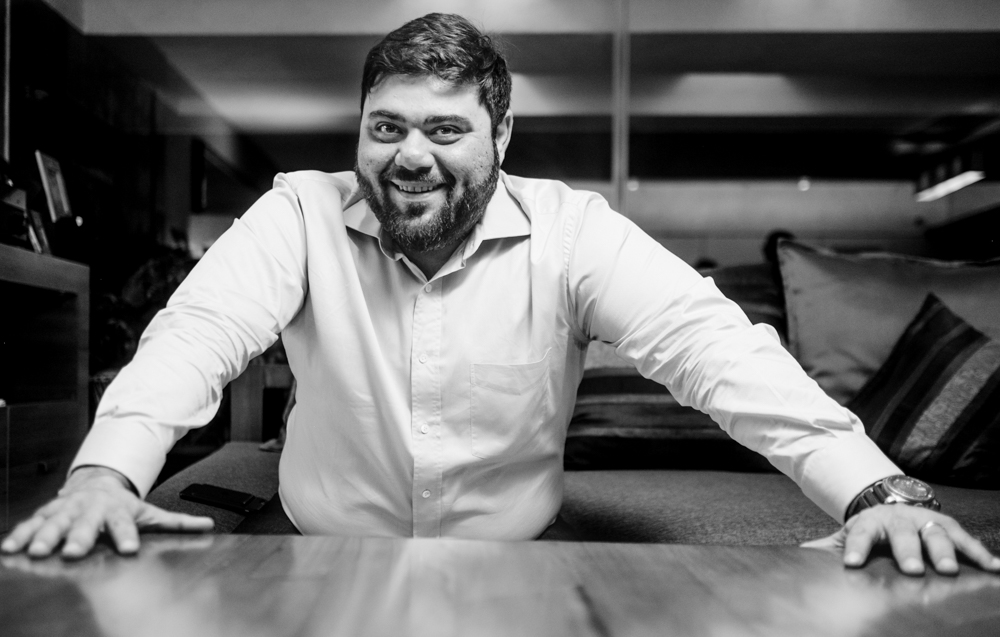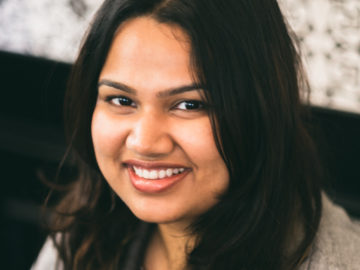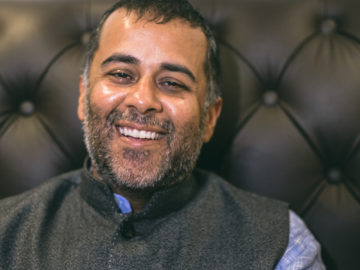You were 13 when you started working, why was that?
Pocket money. It was nice to have more money than your average guy at that point. I was working at a shoe shop, Metro Shoes and I enjoyed my time there. I learnt a lot, you know and I thought I was the shit. It turned out I was pretty shit. Like any other 15 year old I thought I knew everything there was to know about everything and I went off and started my own shoe shop! Which is now a small ATM in Sion, so yea.
You’ve said that having the shoe shop and meeting all these people who came to buy shoes taught you a lot about people?
Yea, more importantly about India and interacting with people. I realized how different and how varied a market India really is. I mean what works in a Colaba will not work in a Kurla. There are five six different markets within even a micro market such as Bombay. I saw the rich customers of Colaba the ones with the money and fancy cars and I saw the guys who walked into Kurla and Sion and wanted to buy plastic slippers because for sixty rupees it lasted them three months. And I learnt what consumption means to different strata. I think that is something that stayed with me.
How did Mocha come about?
So when I was in college and I was “dating”, for somebody with not too much money there is little you can do, the only thing I could do was go up and down Marine Drive in my car. How many movies can you watch, right? I couldn’t afford 5 star coffee shops, ‘cause that’s where everybody was hanging out. I was thinking that Bombay needs more places of entertainment where kids can go and hangout, so I started up these entertainment centers – bowling alleys, video game parlours, and go karting tracks as an entertainment option and as part of that I realized that you need to have FnB. So I started dabbling a bit in FnB. For me really the coffee shop, which I started called Mocha it was just about getting people to hang out and spend the day.
You said you were inspired by the places in Turkey?
I did not want an Italian inspired American chain in India type of situation. Internet had just come around, VSNL One, and what I found out about coffee was that the first coffee house or the first restaurant in the world was a Moroccan coffee house called Kiva Han, which just meant coffee house, literally. So I was like yea this is cool and because Mocha was Moroccan inspired I thought there should also be Sheesha. I went through great pains to source Sheesha in India and we started off. I thought the winner was all the exotic coffees that we had, like 22 different types of coffee. But I was wrong. People were coming for the shakes and the hookah. So hookah took off and became this huge animal. I also enjoyed the process of creating these coffee shops.
I could do anything I wanted and people thought it was cool. I was like, ‘bathroom mein ye daaldo, woh chote chote thermocol balls daldo bas (put those tiny thermocol balls in the bathroom)’, ‘wah wah’!
That’s how it started, the craziness that was to ensue.
Mocha, Salt Water, Stone Water, Smoke House Deli, Social. How do you manage to crack so many of the “It” places? How do you figure, that this is what’s going to work?
I approach restaurants with how it makes one feel. For me a restaurant idea really stems from how I want my customers to feel and then you build everything around it. So for example at some places you go to feel elegant and sophisticated. Then you have to sit up and you have a table and you have a nice long fork and you have a nice long knife and you drink your tea like that with your pinky up. Some places you go to feel very urban, you know suave so of course you want to sink in. You don’t want to sit forward with your hands on the table, you want to lean back and put your feet up. Some places you go because you want to see boys and you want to see girls and some places you go where you just want to be in your flip flops and your shorts, jhalla and you wanna just knock back some beers and not be molested.
You know there’s always a mood to a place and that’s what I always try and figure out, the mood.
I always start with music first, for me that’s a very important part. Whenever I am giving my designer a brief, I always put some music on and I am like, ‘this is the kind of music that’s going to play there’. Del Italia was very romantic and it was old school and charming and Mocha was crazy, everything around you was engineered to start up a conversation. Salt Water Grill for me was Goa. With Social mostly it’s the fact that we found the properties that way and how little can we intervene. Like we don’t want to throw plaster and cement and POP then lambi patti then one more coat of paint, it’s too much work. Deewar aise hai na, theek hai, light maaro (The wall’s like this, fine just throw some light). It’s a little bit of a shortcut.
What’s the hardest thing about being a restaurateur?
Hardest thing about being a restaurateur umm I guess the fact that you can never really switch off. I mean you can switch off at 2 o’clock in the morning but that’s it. It’s a very slim window. Also when everybody else is having a great time, those tend to be your busiest times. I think there is some form of FOMO that happens but then you go to your restaurant and you say, it beats the crap out of being in an office, you know. So I think it balances out, you are having fun when everybody else is working and you are working when everybody else is having fun.
Did you predict the success of Social at this scale where it just took off?
You know I am always nervous, even if it’s just one more outlet. I’m like this is the one that will be my undoing.
This is the one where people are going to say, ki ye bawla ho gaya hai, ye pagal ho gaya hai, abhi dimaag mein kuch aa gaya hai, mata ji aa gayi hai (He has lost it, he’s gone mad, his mind has been possessed).
I’m always very nervous, yeh chalega ki nahi (will this work or not?). I’m always like, kaisa laga, acha hai acha hai? Really really you liked it? I don’t even believe them anymore. So yea I did not see it becoming a big success. There’s always that, you push the envelope a little bit more and you think that this is the one that’s going to blow up in your face. I did not predict it, no I did not. I always thought this would be death and dismay and doomsday will follow soon.
Watch Riyaaz talk about the difference between Gen Xers and Millennials and how Social came to be more than a restaurant?
You are like this Byculla boy who’s made it big. I read this thing where you said that you want to take a Social everywhere from like Nallasopara to Dongri. So do you think it comes from where you come from that you want to be open to everyone?
When I was a Byculla boy I was in St. Mary’s school, which is a nice little school, it was fine. When I went to HR college for the first time ever I was discriminated based on where I was from. People were discriminated based on what they were wearing, what brands and I never really figured that out. I was like, ‘dude either you are cool or you’re not’. At first I was surprised and then I was amused and then I was angry. I mean I’m communicating with you and I think I am cooler than you are but you still are thumbing up your nose at me. For the longest time I think that was a real problem, people were like, ‘the crowd over there is dirty’. What do you mean crowd over there is dirty? This is your city, you are from here, these are your people, face it you know. I was always a little surprised that there was this kind of, ‘we only hang out with Cuffe Parade types or only Peddar Road or Breach Candy and it was all of that shit’. But now I think that’s really changing. A week ago we had this guy Divine perform at antiSocial, for me it was like a big validation. Because there were these kids from Dharavi, who were really cool by the way, they were dressed really well and they were B-boying and they were skateboarding and there were graffiti artists and they were doing all these cool shit and all these Bandra people who couldn’t ever get on a skateboard without falling on their face you know? They were still wearing their dirty T-shirts and their jhalla flip flops while the dharavi boys were like chumma dressed to the T. So for me it was amazing.
You have to party and you have to democratize the party and it has to be made for everyone. India will truly come into it’s own if there’s this kind of cross-pollination, I think.
Sitting in the audience there was Madhuri Dixit with her husband, Dr. Nene listening to Divine and there was Jakarta’s richest man and all these big shots and all these kids from Dharavi and the cool Bandra people and it was amazing that there’s this kind of all embracing scene, which was amazing to me.
Tell us about your mission to save the nightlife
I think that India has a lot to offer when it comes to its cuisine, music, art or theater. It needs places and it needs nightlife for it to flourish. If they take away bars out of the equation, you’re taking out musicians, performers, writers out of the equation, you’re taking out a lot of thought leadership out of the equation. I think that urban centers are centers of thought and they are necessary in any culture that progresses. We have a lot of issues in India, like poverty, illiteracy, health and population problems but you cannot sacrifice your urban contemporary culture at the altar of your historical culture.
People always call culture something that you used to do, but culture is what you do today.
That is what the real meaning of culture is. And for me any kind of progression, any kind of hope that India has, comes from its urban centers. A lot of cultural osmosis takes place in bars and restaurants, that’s where you really land up meeting people. I’ve been to countries that don’t have bars and restaurants and it’s just a small incestuous bunch of people and you rarely meet anybody new, there’s nobody who inspires you so there’s no evolution in the culture. You just keep going round and round the same mulberry bush and everybody self congratulates each other and there’s really no progress.
It’s not just bars and restaurants, it’s even just being able to walk on marine drive at 3 in the morning, you try doing that and people will come and shoo you away, why? It’s my city, I am enjoying my city, my space, but I am not allowed to.
In a sense we are living under this partial curfew but nobody really knows it. You can’t go to the gym late in the night, you can’t watch a late night movie.
What really blows my mind is if it’s legal in the day, how does it become illegal in the night? Each city is known by its nightlife, right? If you take away the geography and the architecture of a city what is really left that gives the city its personality and its face is restaurants and bars, so it’s a very important expression.
You are also working to lower the drinking age to 21
Yes, it’s not a very popular stance. I think it’s a little ridiculous,
you can get married at 21, you can drive a car at 18, you can smoke at 18 but you can’t have a drink at your own wedding.
You can go and shoot somebody in the army but you can’t have a drink. I think the government should take a stand. Juvenile kaun hai, 16 saal wala juvenile hai, 18 saal wala juvenile hai (who is a juvenile, a 16 year old, an 18 yeas old)? You can’t say at 16 you are this and at 18 you are this, at 21 you are this and at 25 you can finally have a drink. I think that is a little bizarre and of course the narrative is not being controlled by me but I will keep pushing and it’s important that people get to choose if they are going to have a drink or not. It is a suppression of our rights in a sense. I feel that 21 is fair, it’s not like Germany which is 16 and it’s not like London which is 18, 21 is alright.
Is there any one restaurant that you wish you had come up with?
Yea, all the time! I mean Indian Accent is one, I like Bombay Canteen. I like some places just for how beautiful they are like Rohit Bal designed this restaurant called Veda and I was like, “wow, it’s incredible”. So there’s lot of times I go to a restaurant and I’m like faceplam why didn’t I think of that, why didn’t I do that? So there’s a little bit of jealousy that comes in but there’s also a lot of admiration that comes in.
What is the biggest myth about the restaurant business?
That it is very glamorous. When you are sitting outside a BMC office on a Monday morning at 9 o’clock, it’s not glamorous. It’s a lot of hard work. Another big myth is that there’s a lot of money. It’s a business with a high mortality rate, 50% of the restaurants don’t survive past 2 years and 90% don’t survive 5 years. If you google today the best restaurants of Mumbai from 2012, I guarantee you 8 of those 10 will be shut by now and these are the best ones, critically acclaimed and they are all shut.
They don’t last very long, fruit flies and restaurants.
You don’t mince your words when talking about critics or your opinion on service charge so has that gotten you into trouble?
Contrary to what you think, I do watch what I say. I’m not really as outspoken as I’d say Vishal Dadlani is, you know.
But I think, sometimes I catch myself not speaking my mind and I do really get annoyed with myself. What am I afraid of and do you then succumb to this paranoia, this environment of fear that is carefully being engineered around you?
I don’t have an opinion on everything but some issues that I do feel strongly about I decide that it’s time to take a stand and speak up, specially for things which are dear to me. People who work in the restaurant business are my heroes. I work in the restaurant industry but I don’t work in a restaurant and it’s really hard work. I have put Fitbits on my guys and they are doing 15 Km a day, it’s crazy. They are on their feet for eight to nine hours and if you think front of the house is bad you should try the kitchen because temperatures in a Delhi kitchen go 55˚C . You’re standing in front of a stove, it’s a high-pressure environment, people are screaming, you’re trying to serve 15 different tables at the same time, it’s an extremely hard business. You get very little pay because in India you want to see lots of people. If I look up and I don’t make eye contact with a staff I think yaar service theek nahi hai (man, the service is not good). It’s not about how friendly or knowledgeable the service is. And for some reason I think when people they go to a restaurant they don’t want service, they want servants. You see all these foodie groups on Facebook where they say, ‘those guys need to be taught a lesson in humility, who do they think they are? They don’t understand customer service, customer is always right!’ They expect almost a form of servility but at the same time by the same token of exchange they will not look at the host in the eye, they will forget to say please and thank you, they will snap their fingers at them to call them, and you know occasionally they will download all their frustration because in their head now they are bada saab (the big boss) and they can give it off to this you know low caste person in a sense.
So when a guy is going through so much shit and you try and take away the one thing that is giving him some money then I’m going to get pissed, no matter what government it is, I have the right to charge service charge and if you don’t like it go somewhere else but I’m not giving up that right, not for my people.
Unspool
What do you think is the most over rated restaurant right now?
(laughs) Nope, pass. I’m the President of the restaurant association, hello!
Who is one person you’d love to see at social?
It’s a tough one, never really thought of that. Mahatma Gandhi. That’ll be kind of freaky no?
Do you want a Michelin star or 100 more socials?
100 more Socials any day. Humne izzat bahut kamai hai abhi paise bhi kama le (We’ve earned enough respect, let’s earn some money now)
Where do you buy your shoes from?
A place called Pedro. Online. PEDRO, sirf naam hi kaafi hai (the name is enough)
What is the one place you’d never open Social at?
Umm.. maybe Cuffe Parade.
Give us three millennial terms
Goals. Dope. Fuck that shit.






